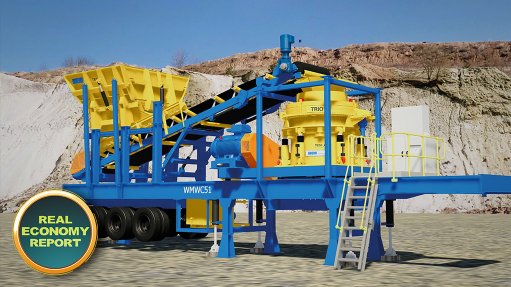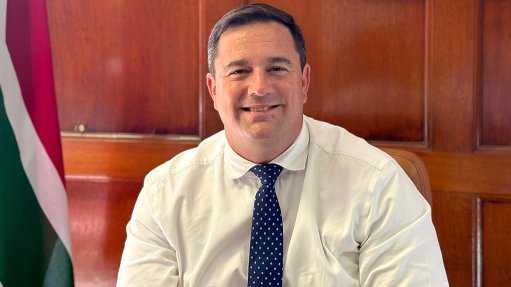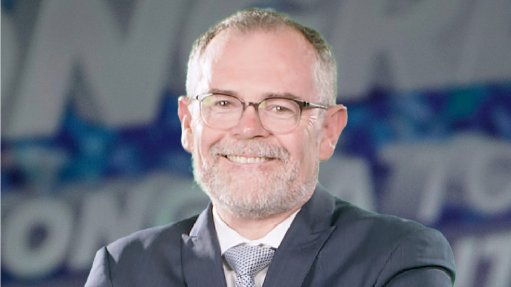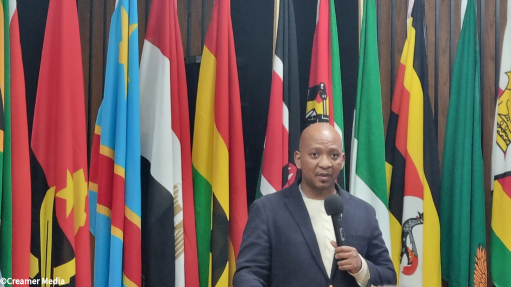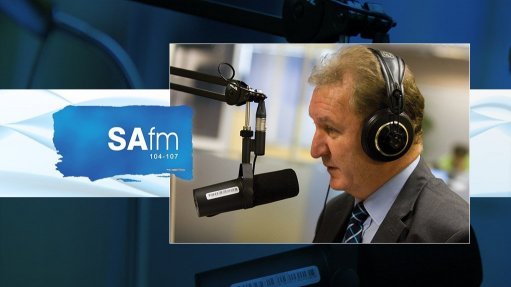Career guide to assist in creating jobs in plastics industry
Industry association Plastics South Africa’s (Plastics SA’s) training division plans to create an electronic career guide that will list the available skills and job opportunities in the local plastics industry.
Although the project is still in progress, the aim is to make the information available electronically on the association's website later this year, Plastics SA executive director Anton Hanekom tells Engineering News.
“This project is in line with Plastics SA’s training objective of promoting the career opportunities that exist in the local plastics industry,” he says.
The availability of the information is expected to assist companies that are recruiting and will provide information on the additional skills and the specific qualifications required for each position, as well as offer career guidance for job seekers.
“This initiative is aimed at creating an industry and skills development plan that is quantifiable, measurable and that will create jobs.
“Every profession in the plastics industry will now be linked to its relevant organising framework of occupations, alternative job titles, the various responsibilities associated with that job and the qualifications required for the position,” Hanekom notes.
Priority skills for the plastics industry, as identified by the Manufacturing, Engineering and Related Services Sector Education and Training Authority (Merseta) and Plastics SA, include plasticians, setters, mould makers and polymeric fabrication inspectors.
Plasticians are crucial in the manufacturing process, while setters are responsible for setting up the manufacturing equipment.
These priority skills were identified by Merseta’s Plastics Chamber, with the support of Plastics SA, which held a series of regional workshops in Durban, Cape Town, Port Elizabeth and Gauteng last year to determine future skills needs in the industry and to design an Integrated Qualifications Frame- work – a first for the plastics industry.
The subsectors that were mapped during the workshops were packaging, engineering, industrial rubber, composites, thermoplastic fabrication and recycling.
“The main objective of this initiative was to map the industry to get a clear idea of the occupations that exist, and their details, the skills shortages and job vacancies. From this, a value chain was established for each subsector,” Hanekom states.
Meanwhile, in July last year, Plastics SA, together with the Whisper Boat Building Academy and the Cape Town Boatbuilding and Technology Initiative, began a one-year pilot project to train two groups of 15 deaf students to work with composites.
Merseta signed a memorandum of understanding committing itself to funding the full tuition costs of the 30 students recruited by the project.
Classes for the six-month course consist of theoretical and practical classroom-based training, combined with workplace experience that was presented as individual skills programmes.
The first group of learners graduated at the end of last year and will be issued with a Plastics SA certificate of competence in lamination.
This project will continue this year when another group of 15 deaf students will start their training.
Plastics SA supports the National Skills Development Strategy III that was launched in January last year by the Department of Higher Education and Training.
Hanekom points out that the key driving force behind this strategy is to improve the effectiveness and efficiency of the local skills development system.
“The strategy places significant emphasis on the relevance, quality and sustainability of skills training programmes to ensure that these impact positively on poverty reduction and the eradication of inequalities,” he adds.
The plastics unit within the Department of Trade and Industry, Plastics SA and other government departments, as well as key stakeholders, facilitated three provincial workshops in Cape Town, Johannesburg and Durban last year to finalise the draft strategy and action plan for the development of the plastics industry as identified in the National Industrial Policy Framework (NIPF).
An Industrial Policy Action Plan was also developed to outline key action programmes that will be implemented to achieve the objectives of the NIPF.
Recycling
In 2010, there were 194 recyclers who recycled over 241 000 t of plastics, a 6% increase on that recycled in 2009.
Meanwhile, the growth in virgin consumption increased by 4.7% over the same period.
Hanekom says this growth can mainly be attributed to the three most common plastics, namely low-density and linear low-density polyethylene, the recycling of which increased by over 9 000 t; polyethylene terephthalate, which increased by about 6 000 t; and high-density polyethylene, of which over 3 000 t more was recycled in 2010 than the previous year.
Further, he notes that the operating cost of recycling will continue to increase, owing to rising electricity tariffs that account for about 22% of the overall costs.
Recycling capacity has been added in the Western Cape, the Eastern Cape and KwaZulu-Natal, and will only be reflected in the recycling data for 2011 that will be released towards the end of this year.
Hanekom says alternative recycling methods are also being researched and trial facilities have been built for the generation of diesel from plastics waste.
“There are at least three different investments in diesel-from-waste projects. However, none of these are making diesel as yet, although small pilot plants have proven the technology,” he notes.
However, information regarding the companies which made these investments cannot yet be divulged as the projects are still in their infancy.
Some small-scale factories are experimenting with building panels from plastics materials, while others have started the small-scale production of roof tiles from plastic waste.
As a result of the increasing need for more and cleaner recyclable materials, a number of private organisations and the local governments in the larger metropolitan areas are investing in separation-at-source projects to enable them to divert more recyclable materials away from landfills to recycling centres.
Source separation is the primary method of separating the recyclable waste stream from the solid waste stream.
Meanwhile, the Department of Environ- mental Affairs’ decision to wind up the operations of plastic bag regulator Buyisa-e-Bag is expected to create more opportunities for the plastics industry to fulfil its extended producer responsibility.
“Plastics SA is optimistic that the winding up of Buyisa-e-Bag will enable us to develop strategies that are best suited to the consumer’s and the manufacturer’s needs,” Hanekom says.
Name Change
Despite the Plastics Federation of South Africa remaining the organisation’s registered name, it changed its brand name to Plastics SA in September last year.
The plastics industry’s movement to being more environmentally responsible and sustainable, an acute awareness of consumer health and safety, tough economic conditions and new entrants to the plastics markets have affected the way business in the plastics industry is being conducted and pose significant challenges.
“The new identity aims to represent recent changes in the organisation’s senior management, structure, vision and strategic direction to accommodate significant changes in the local and international plastics landscape,” explains Hanekom.
He remains optimistic about the future. “We have a major drive to involve more plastics companies in our associations. Together, we can play an active role in the growth and development of the industry by influencing roleplayers and making plastic the material of choice,” he concludes.
Comments
Announcements
What's On
Subscribe to improve your user experience...
Option 1 (equivalent of R125 a month):
Receive a weekly copy of Creamer Media's Engineering News & Mining Weekly magazine
(print copy for those in South Africa and e-magazine for those outside of South Africa)
Receive daily email newsletters
Access to full search results
Access archive of magazine back copies
Access to Projects in Progress
Access to ONE Research Report of your choice in PDF format
Option 2 (equivalent of R375 a month):
All benefits from Option 1
PLUS
Access to Creamer Media's Research Channel Africa for ALL Research Reports, in PDF format, on various industrial and mining sectors
including Electricity; Water; Energy Transition; Hydrogen; Roads, Rail and Ports; Coal; Gold; Platinum; Battery Metals; etc.
Already a subscriber?
Forgotten your password?
Receive weekly copy of Creamer Media's Engineering News & Mining Weekly magazine (print copy for those in South Africa and e-magazine for those outside of South Africa)
➕
Recieve daily email newsletters
➕
Access to full search results
➕
Access archive of magazine back copies
➕
Access to Projects in Progress
➕
Access to ONE Research Report of your choice in PDF format
RESEARCH CHANNEL AFRICA
R4500 (equivalent of R375 a month)
SUBSCRIBEAll benefits from Option 1
➕
Access to Creamer Media's Research Channel Africa for ALL Research Reports on various industrial and mining sectors, in PDF format, including on:
Electricity
➕
Water
➕
Energy Transition
➕
Hydrogen
➕
Roads, Rail and Ports
➕
Coal
➕
Gold
➕
Platinum
➕
Battery Metals
➕
etc.
Receive all benefits from Option 1 or Option 2 delivered to numerous people at your company
➕
Multiple User names and Passwords for simultaneous log-ins
➕
Intranet integration access to all in your organisation








